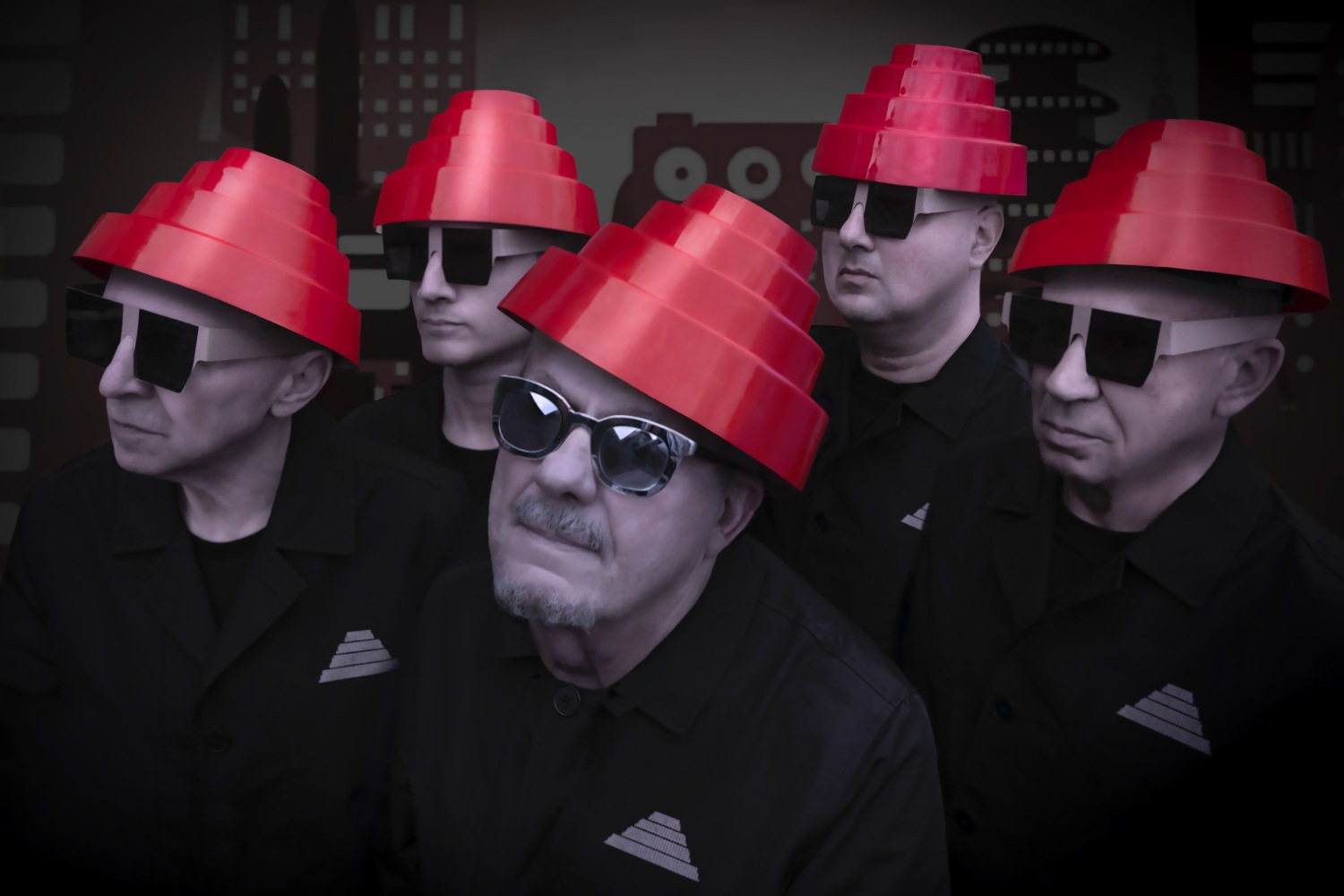Photos by Jay Spencer
Suffice to say, Devo are one of the true originals.
Five decades is a long timespan for any project, let alone for a band as profoundly disciplined and committed to the bit as Devo. But for bassist and principal songwriter, Gerald Casale, intestinal fortitude has always been part of the seminal art-punk’s broader MO.
Read up on all the latest features and columns here.
“We were the pioneers who got scalped.” he explains from his Californian home.
“All the things that are expected of bands today, we were doing back then and being maligned for it. We were marketing ourselves, branding ourselves… controlling everything about it, textwise, visually and sonically. People were either blown away or they wanted to kill us.”
“We were original and we weren’t ashamed of being original.”
Suffice to say, Devo are one of the true originals. A band defined by dichotomies, who frenetically balance high and low culture in a way that would make Roy Lichtenstein blush, their eventual success is the story of something truly subversive kicking in the door to the mainstream and taking up permanent residency therein, claiming squatters rights and refusing to budge. That is, until now.
The inherent catchiness of mainstream singles like ‘Whip it’, ‘Gates of Steel’ and ‘Girl U Want’, coupled with a formidable canon of bonafide cult classics, have afforded the band the right to leave on their own accord, whenever they damn well please. Sadly, this current world tour (which will see them perform in Australia as part of the Good Things festival) is said to be Devo’s last, at a time in which their theories of de-evolution could not be more relevant, nigh on necessary. It’s a revelation not lost on Casale.
“After 50 years, there is no doubt that de-evolution is real.” he remarks, in a satirically camp voice that instantly recalls the product videos of corporate America.
“The world is getting exponentially more nuts every moment, even more than it was in 1973 when we started this band… De-evolution is in full swing.”
Hailing from the musical (non) hotbed of Akron, Ohio, Casale has been with Devo since its inception, with the band originally coming together as a conceptual art project – music only making up one slice of the broader Devo multimedia pie.
For Casale and his merry band of weirdos, Devo was, and always has been, their way of kicking against the pricks.
“Akron back then was a depressing, right wing, religious place.” he explains.
“Devo was our only form of defence. We would go into the basement and create and we would be protected.”
By the time their debut album dropped, (1978’s Eno produced Q: Are We Not Men? A:We Are Devo!) the band had already spent the previous four years tucked away in their little mid-western incubator, toiling away at demos and short films with the same military-like discipline that would serve them so well over the ensuing years.
This early period of gestation proved an extremely formative one for Devo, who have always felt somewhat out of step with the rest of humanity, whether they are ahead of the curve, or often, at right angles to it.
“It was the very foundation of Devo, as we know it’”, explains Casale.
“We were isolated up there in northern Ohio. Nobody paid any attention to us. We honed our concept and our playing for nearly four years so that when we finally went public we couldn’t be compromised.”
“We bought a TEAC 4-Track because we read somewhere the Beatles recorded Sgt. Pepper on one. We figured if it was good enough for the Beatles then it was good enough for Devo.”
When Devo finally did emerge, they did so as a fully formed unit, with a sound and aesthetic that shared little in common with anything that had come before it.
“We had no distractions. We would get together and have these unfiltered ideas and we would experiment with them and turn on the recorder.”
These recordings, which would eventually make up the Hardcore Devo Vol. 1 and 2 compilations, are a seminal document of a band literally inventing the colour palette of what would eventually become Punk and New Wave, as well as being an early example of the kind of DIY recording ethos that has since become standard in the modern musical underground.
Of all of the pioneering sounds that can be heard on the Hardcore Devo tapes, perhaps there is nothing more DIY and groundbreaking than the presence of original drummer Jim Mothersbaugh’s homemade electronic drum kit-one of the earliest documented uses of electronic drums anywhere in the history of recorded music.
“There were no such things as Electronic Drums back then” explains Casale.
“Jim would be building new prototypes and bringing them to rehearsal and we would watch his ideas develop… attaching various contacts to Remo practice pads and then running that through a bunch of different effects and processing to create trash can sounds and other weirdness.”
“He took his contraptions to a custom car place in Akron that specialised in hot rod exhausts and had them build an elaborate frame for his electronic drums, so he sat inside this throne of bent exhaust pipes. I’m sure he still has it somewhere.”
This combination of organic and synthetic instrumentation would come to characterise the Devo sound, and would follow the band out of their small town basement and onto their official releases after being ‘discovered’ by David Bowie and falling in with the burgeoning CBGB’s/Proto-Punk scene of the mid seventies.
When 1982’s ‘Whip It’ became a surprise MTV hit, partly due to its iconically hokey, faux BDSM video clip, it provided validation to a band who had already been making art films to accompany their music for the better part of a decade- before music videos were even a thing.
“Early on, myself and my good friend Chuck Statler really pushed the idea of Devo as a Multimedia project,” remembers Casale, fondly.
“Chuck had a lot of camera equipment and we had the idea to make these film shorts where the songs would lead the narrative. The plan was to put out one a year every year-because LaserDisc was going to take over in 1974.”
While LaserDisc never did quite find its rhythm, Devo certainly did, with the band garnering a reputation amongst musician circles for metronomic tightness, both in their live playing and in the angularity of their compositions.
As an integral part of one of the tightest rhythm sections of the 80’s, you would expect Casale to be at ease with his competence as a player, but these kinds of accolades don’t appear to sit well with our boy from Akron.
“Calling myself a musician would be an insult to real musicians,” he remarks in a deadpan tone, before adding, “I’m definitely an artist using music.”
Much more forthcoming is his praise for former Devo drummer, Alan Myers, Casale’s rhythmic running mate during Devo’s halcyon days, who sadly passed away in 2013 after a battle with stomach cancer.
“Alan was a true technician, a wizard. He was a Jazz player when we found him and his technique was impeccable – like a robot.”
When he is donning his musician hat (or rather, dome), Casale has traditionally opted for oddball body shapes on his basses, even running a Gibson Ripper with the horns obnoxiously hacked off back in the early days of Devo.
More recently, he has exhibited a love for Steinberger Basses, which given their unorthodox body, futuristic graphite neck and lack of headstock, almost seem like they were designed with Devo in mind. For Casale, who runs his vintage L2 directly into the board with no amp, the choice of Steinberger is much more than merely an aesthetic one.
“I fell in love with the original Steinberger bass and I still haven’t found anything better in terms of tone, playability… the action on the neck. I don’t have big hands but I can play it like a bass player with big hands. We can run into each other on stage and it will never go out of tune. I just love the thing.”
Similar is his love for vintage analog synths like the Minimoog and Arp Odyssey, which Devo have specifically rebuilt, and in Casale’s words, ‘fortified’ to withstand the rigours of international touring.
With 2023 and the current world tour marking the 50th anniversary of the Devo project, you can’t help but wonder if Casale and band feel a sense of validation at the notion that something so weird could have this much staying power.
“When we started out, we were laughed at in our home town. We have been pleasantly surprised since 1973.”
Devo will be appearing nationally at the Good Things Festival as well as undertaking a run of sideshows, dates are below.
DEVO AUSTRALIAN TOUR 2023
Sunday 26th November – ICC Super Theatre, Sydney
Wednesday 29th November – QPAC, Brisbane
Wednesday 6th December – Palais Theatre, Melbourne
Presale: Wednesday 18th October @ 9am local time
General Public on sale: Friday 20th October @ 9am local time

